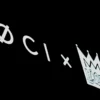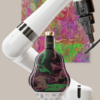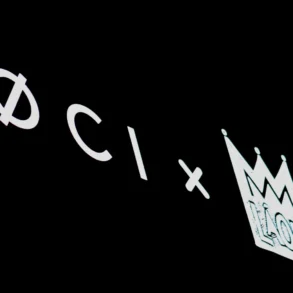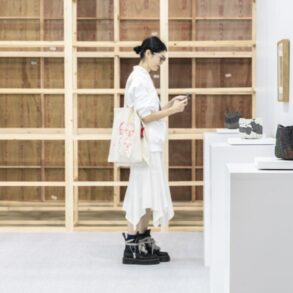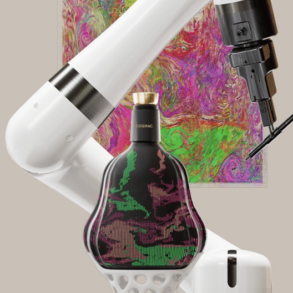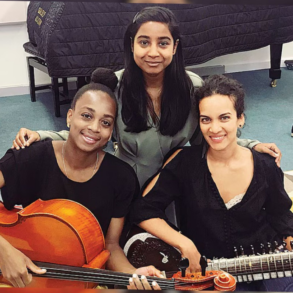In February 2015, Matt Zingler and Tariq Cherif launched the first-ever Rolling Loud festival. But while the inaugural Miami event was a success, it was also quite the learning experience for Zingler, who had to take matters into his own hands — literally.
“I booked companies to drop off bike racks [and tents]. They just dropped them off in the front of the building, and I had to set them up myself… in Wynwood in Miami, with a pistol on me, at 4 in the morning. There’s homeless people and crackheads and s—. It was crazy as f—, dude.”
Since that harrowing first year, Rolling Loud is no longer a DIY venture for Zingler and Cherif — it now bills itself as the biggest hip-hop festival in the world. Along with the annual Miami fest, Rolling Loud has expanded to California and Thailand, with other iterations having taken place over the years in New York, Australia, Portugal, Canada, the Netherlands, Germany, and Austria.
They’ve also overseen the emergence of Rolling Loud as what they proudly call a “lifestyle brand,” with expansions into merchandise, including collabs with Modelo and the WWE. The latter marked the first time the wrestling league ever worked with a music festival, and the partnership expanded beyond T-shirts into actually having wrestling matches during the festival itself.
There’s also a record label, which they launched with a Rae Sremmurd and Duke Deuce single in 2022. While there haven’t been more releases yet, the founders have big plans for its future — as well as for a podcast (appropriately titled “The Founder$”), a movie, and more.
All of this — the worldwide concerts, the big-deal collaborations, the multimedia domination — shows that Rolling Loud is much more than a music festival. It has become an event, the founders say, that many artists plan their whole year — and their release schedules — around. The name has become synonymous with modern-day hip-hop, from the cutting edge to the mainstream.
“We’re here to prove that hip-hop is a global force,” Cherif says. “Our mission is to spread happiness to millions of people throughout the world while promoting hip-hop culture.”
Ahead of the 10th anniversary edition of the festival — which takes place in Miami from December 13-15 and features Future, Travis Scott and Playboi Carti headlining — Cherif and Zingler sat down with GRAMMY.com to discuss those rough early days, how the festival has evolved, and the founders’ plans for the future (hint: they involve outer space).
You guys have talked about how back when you were first promoting shows, you threw an event with Rick Ross that didn’t go well. But I wanted to know some specifics: how on earth did you lose $30,000 in a single night?
Tariq Cherif: [Laughs] First of all, it was our first event at a club. Anything we had done prior to that was a house party. And second of all, we intended to produce concerts like we ended up doing shortly thereafter.
But with Rick Ross, we booked an after party with him when there was an arena show for FAMU homecoming in Tallahassee, Florida. This was in 2010. The arena show had a lot of the big rappers at the time, and just big personalities: Rick Ross, Waka Flocka, DJ Khaled.
We saw Rick Ross tweet an email address for after party bookings. And I was like, “Yo, Matt, we should book Rick Ross for this after party.” We had no business promoting a Rick Ross after party. We’re not after party promoters — we’re concert promoters.
Also, we got beat out by the promoter for the arena show. At the time, there were only two nightclubs in Tallahassee. We had one booked, and the arena show promoter had the other. The arena show had their DJ pushing their nightclub the whole time, even though they didn’t have any of the artists booked to show up. And we had Rick Ross booked — we were paying him.
Long story short, everybody went to the other party. That was what was dubbed as the official after party. But what’s cool is, none of the artists went there. So if you came to ours, you got an eight or nine-song Rick Ross performance, but there were only like 100 people there. But if you went to the other club, it was 2,000 people but no artists.
What did you come away from that with?
Matt Zingler: The concept of a 2,000 cap club, selling tickets for $50, grossing $100,000, netting $70,000 because you pay the artist 30 grand — it’s not a reality. When people don’t buy the tickets, you’re f—ed.
When we decided to go on to our next booking, which was Curren$y, we did an actual music venue and an earlier show that was an actual concert, and we priced it accordingly. We focused on selling an event instead of a nightclub and bottles and a late crowd.
Before Rolling Loud, you were booking concerts. Why create a festival, as opposed to continuing to promote individual artist shows?
Cherif: That came about organically. We grew into it. We were throwing hip-hop shows with one headliner and a couple support acts all over the state of Florida. By the time we launched Rolling Loud, we’d been doing it for five years, and we wanted to grow into arenas out of the small clubs that we were in. But it was really hard in Florida, especially at the time. All the arenas were controlled by Live Nation or AEG or any of the big corporations. We were kind of blocked from these bigger venues.
We also were seeing at our shows that artists in a similar subgenre would have the same fans. So Curren$y or Wiz [Khalifa] or Mac Miller or Action Bronson or any of those types of guys would have a lot of the same fans at the shows. And a Robb Bank$ or Flatbush Zombies or Denzel Curry would have a separate group of the same fans at their shows. At all of our shows would be some super hip-hop fans that would just come to every show.
We realized hip-hop has a lot of subgenres. If we could unite all of them on one show, we could do a bigger show than what we’ve been doing, charge more for a ticket, but also provide people a lot of value. So we found a warehouse in Miami, and the rest was history.
What was that first year like?
Zingler: The first festival capacity, I want to say, was around 5,000, 7,500 patrons. It was an indoor room. The stage was smaller. We had some kind of barricade — probably bike racks. Stage two was very small. It was an outdoor stage, kind of iconic because a lot of legends performed on that one. You had, like, Travis Scott. You had Post Malone there before he was anybody. You had XXXTentacion — a bunch of acts were on that stage.
It’s a very, very large difference between what we do now and what we did then. I mean, our main stages now cost anywhere between $1.3-$1.7 million, just for the production for one stage. At the time, I want to say that the total stage cost was maybe 25, 30 grand. We’re building stages now that are 80 feet deep, 280 to 320 feet wide — versus at that time, probably 20 feet deep by 40 feet wide. We don’t even have a stage that small anywhere at our festival now. So there’s definitely leaps and bounds.
Was it actually you two setting up the bike rack barricades?
Zingler: I was there late. Tariq was also in town. I booked companies to drop off bike racks. They just dropped them off in the front of the building, and I had to set them up myself until four in the morning. Same thing with the tent vendor: they just dropped off these tents and I’m like, “You gotta set them up.” They’re like, “You didn’t pay for that.” I was like, “I’ll pay for it now.” And they’re like, “We don’t have the people to do it.” And I was like, F—.
So I’m literally setting up tents. This is by myself in Wynwood in Miami at four in the morning. There’s homeless people and crackheads and s—. It was crazy as f—, dude. Definitely humbling, for sure.
So the next year, I assume you paid the setup fee?
Zingler: Next year I was like, “I’m not hiring your company unless you’re setting up the tent and putting up the bike rack, and here’s where I want you to put it.” Lesson learned though, man.
Rolling Loud got associated in its early years with the SoundCloud rap movement.
Cherif: That was lightning in a bottle. It was a growing together situation where we were producing these smaller concerts throughout Florida. These artists you’re talking about — Robb Bank$, Denzel Curry, XXXTentacion, wifisfuneral, Smokepurpp, Lil Pump, Pouya — we booked all of them for their own headlining shows, but we also would book them to open for artists when we’d bring them to Florida. So we were building this scene together throughout all of Florida, and really championing each other.
We were the guys doing the shows. They were the artists coming up that were lit. It was building it brick by brick together. When we launched Rolling Loud, we knew it was super important to represent that on the show, because we were watching the growth firsthand, and all those artists had earned it.
The first Rolling Loud has Denzel Curry, Pouya, Robb Bank$, wifisfuneral, Cashy. Some of the names aren’t popping anymore, but at the time they were. And then by the second Rolling Loud we got XXXTentacion and Ski Mask the Slump God. By the third Rolling Loud, we got Lil Pump and Smokepurpp. We just saw that we were a part of that genre. Whether we were working with the guys, friends with the guys, helping manage them, tour manage them, promoting them — it was all hand in hand. It was an organic unfolding.
How did you expand beyond that genre without losing your identity?
Zingler: As the brand became larger, we got more stages and the ability to book up-and-coming talent. We’ve never lost our ability to see who’s buzzing. SoundCloud was a unique time. Nowadays you have TikTok, you have Twitter, you have a bunch of different platforms you can scour to find budding talent.
Back then there was a strong Florida scene. I would say there’s still a strong scene in Florida, but artists are popping up all over the map every day. It’s different. You know, an artist one day has a song on TikTok, and he’s a superstar within a week. That’s changed a little bit of the landscape of music.
But when we book our lineups, if you look down at the bottom, you’re always going to see the new hot buzzing guys, people you don’t know. Fans love that. We’re booking an average of 30 to 36 artists a day on Rolling Loud. It’s a really custom-tailored product that you’re going to see — 110 to 120 rappers at the festival.
We never lost our identity or connection with up-and-coming talent or the community. It’s only gotten stronger. Because we put more shows up on the board and we platformed more artists, some of the artists that were an opener at one point became headliners — people like Travis Scott and Post Malone. Certain people in that wheelhouse have grown with us over time from the beginning and became something larger. So when we expand our brand in different markets, we definitely tap in and we know what’s hot.
I wanted to ask about that expansion. It was just a couple of years into Rolling Loud that you guys went to LA, and from there put on shows internationally. What was behind the decision to expand the brand? Why not just have the biggest event in Florida once a year for the rest of your lives?
Cherif: That was a topic of much contention between Matt and myself, because I felt like before we look at expanding, let’s be the biggest we can be in Miami, where we don’t have competition.
But we kept talking it over. And Matt had a great point: you’re only as good as your last show. Also, when it comes to the brand, we’ve got it right now. People want it in the West Coast, which we saw on our socials. People from all over the world were saying, “Bring this here,” but we especially got a lot of that from California. So it’s very much a Matt-driven thing that at first I disagreed with, but I think it was the right decision in the end.
Speaking of LA, there was a moment there in 2019 when you had to switch the order of the final acts at the last minute. Can you tell me about that?
Cherif: This was a super-tumultuous day for me. Very awkward, very stressful. At the time — even still today, but especially at the time — Lil Uzi Vert was one of our most in-demand artists. He was synonymous with the Rolling Loud brand. This is the first time we booked Chance the Rapper. And we love Chance the Rapper. Acid Rap is one of my favorite albums. We booked him prior to him releasing [The Big Day] that year, just taking a bet on the album.
On show day, we have an app. In the app, we see people build their schedules. Uzi was the most scheduled artist, and Chance was further down the list. We also just knew anecdotally from our socials and from looking at our crowd that he was super important.
So our artist relations team informs us, “Uzi’s jet is grounded in Philly. They won’t let them take off due to weather. He’s gonna miss his set.” And we’re like, Oh no, we cannot have Uzi miss his set. This is when the song “Futsal Shuffle” had just come out, which they ended up shooting the video for at the show.
Uzi’s team said, “They’ll let it take off [later]. If you can mess with the schedule, he can be there to perform.” So we made the decision to go to Chance and his team. It took a lot of hours and a lot of conversations. We basically explained to them, “Hey, Uzi is really important to us. I would really appreciate it if you would swap with him so he can still perform.”
Some of the business people around Chance were like, “Screw that. Just pull Uzi off the show. No other festival would ever ask the headliner to go before the direct support act.” We were like, “Yeah, but no other festival is Rolling Loud. We care about our fans and we know our fans really want to see Uzi. He’s the most requested on our app and our socials. We need to make this happen.”
Long story short, we made it happen. It was not easy, but it went down. Chance was very accommodating and did that for us, and we’re very thankful for it.
There’s only two of you guys. Has there ever been a festival where the two of you both were not on site? Could you see a point at which that would happen?
Cherif: We both go to every show. There’s only one show that Matt couldn’t make it, and that was Australia, 2019. I don’t really count it, because it was a one-stage, one-day show that was pretty turnkey, and we had some good partners. But as far as us producing a multi-day, multi-stage, very involved show, we both go to every show.
Will that still be the case 10 years down the line?
Zingler: I think it’s important for us to remain very active in the brand. We are the heartbeat to the festival. We are the heartbeat to the brand. It wouldn’t be the same without both of us. You can duplicate what we do, but it will never be authentic. It will never have the history. It will never have the connection. It’ll just be a dupe, a copy, a replica of something that can never be replicated.
What do you want Rolling Loud to be in 10 years?
Zingler: We’re going to space. Elon, give us a call. We’re going to be the first festival in space. We’ll be with Elon, sponsored by SpaceX, on a new planet. Uzi will headline and come down in his spaceship.
You guys have been very open about viewing Rolling Loud as a brand. What does that mean? What is Rolling Loud beyond concerts?
Cherif: We used to say this before it was real, but Rolling Loud is a lifestyle brand. Our mission is to spread happiness to millions of people throughout the world while promoting hip-hop culture. We’re here to prove that hip-hop is a global force. We just executed a show in Thailand with 40,000 Asian people all knowing every word to every song, all dressed in clothes that you’d expect to see at a hip-hop culture event.
The name Rolling Loud is synonymous with hip hop. When you think hip-hop, you think Rolling Loud, and when you think Rolling Loud, you think hip-hop. Other extensions of the brand separate from the festival are the merchandise, the content, music, film. Just building a whole world around hip-hop and being that vehicle to encapsulate the whole feeling and spirit of the genre.
With the flagship show on the horizon, what’s a typical day like for you guys?
Cherif: Thankfully, we have a great team. So the days of Matt pulling barricades, and me talking to every artist manager, all the things that we used to do hands-on ourselves — we don’t have to do those things anymore. But we do need to coordinate with all of our teams, our department heads and our festival director. We need to make sure everything’s dialed in the way that we want it.
Also, continuing to market the show, because we want to make sure the show is sold out prior to gates opening. So we’re on the phone with managers, agents, the artists themselves, getting them to post the flier and promote the show. We’re trying to line up special guests. We’re just doing everything in our power to dot our i’s and cross our t’s, and make sure that we have the best event possible, especially for our 10-year anniversary.
So day to day, we’re waking up, we’re in our group chats, we’re at our office, we’re on call. We’re doing everything. Nobody’s too big or too small for anything. So it’s like, “Let’s get it done. Who’s got the bandwidth for it? Whose department does it fall in? All right, great, execute.”

